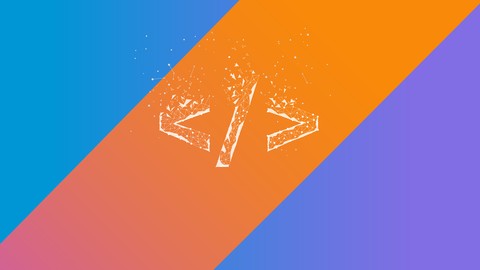
Kotlin: Master Kotlin Programming – Step by Step Guide!
Kotlin: Master Kotlin Programming – Step by Step Guide!, available at $54.99, has an average rating of 4.15, with 140 lectures, 4 quizzes, based on 95 reviews, and has 520 subscribers.
You will learn about Learn to configure environment for Kotlin development Discover how to mimic the concept of static in Kotlin using Companion Objects along with Object-Oriented Kotlin programming Explore recursive functions, pattern matching, and immutable data structures. Learn higher-order lambda expressions and generics. Apply the new Android Kotlin KTX extensions to make app development more concise, pleasant, and idiomatic. Get the grips on Extension functions and Data classes Grasp the Kotlin Standard Library API Use Kotlin to build a DSL This course is ideal for individuals who are This course is for programmers who are new to Kotlin. Professional developers and students who want to learn more about Kotlin and functional programming concepts. Moreover it is intended for all levels, and developers with prior knowledge can benefit because the course also covers advanced topics of Kotlin. It is particularly useful for This course is for programmers who are new to Kotlin. Professional developers and students who want to learn more about Kotlin and functional programming concepts. Moreover it is intended for all levels, and developers with prior knowledge can benefit because the course also covers advanced topics of Kotlin.
Enroll now: Kotlin: Master Kotlin Programming – Step by Step Guide!
Summary
Title: Kotlin: Master Kotlin Programming – Step by Step Guide!
Price: $54.99
Average Rating: 4.15
Number of Lectures: 140
Number of Quizzes: 4
Number of Published Lectures: 140
Number of Published Quizzes: 4
Number of Curriculum Items: 144
Number of Published Curriculum Objects: 144
Original Price: $199.99
Quality Status: approved
Status: Live
What You Will Learn
- Learn to configure environment for Kotlin development
- Discover how to mimic the concept of static in Kotlin using Companion Objects along with Object-Oriented Kotlin programming
- Explore recursive functions, pattern matching, and immutable data structures.
- Learn higher-order lambda expressions and generics.
- Apply the new Android Kotlin KTX extensions to make app development more concise, pleasant, and idiomatic.
- Get the grips on Extension functions and Data classes
- Grasp the Kotlin Standard Library API
- Use Kotlin to build a DSL
Who Should Attend
- This course is for programmers who are new to Kotlin. Professional developers and students who want to learn more about Kotlin and functional programming concepts. Moreover it is intended for all levels, and developers with prior knowledge can benefit because the course also covers advanced topics of Kotlin.
Target Audiences
- This course is for programmers who are new to Kotlin. Professional developers and students who want to learn more about Kotlin and functional programming concepts. Moreover it is intended for all levels, and developers with prior knowledge can benefit because the course also covers advanced topics of Kotlin.
Kotlin is a statically typed language whose syntax is more expressive and concise than Java’s. Kotlin has been adopted by Google as a first-class language for developing Android apps. Since then, Kotlin has gained a huge popularity worldwide among developers due to its highly appreciable features therefore it also helps to build amazing applications in an easy and effective way.�
This course is an easy-to-follow guide with a step-by-step approach which will get you up and running with Kotlin basics and fundamentals such as variables, data types, string templates, expressions, null values, and loops. You will also learn to design application structures using functional programming concepts and implement business logic using tools provided by Arrow library. Next you will be introduced to using the Android Studio IDE which covers the concepts such as functions, lambdas, properties, object oriented code, safety aspects and type parameterization, Microservices, testing, concurrency which will guide you to write Kotlin’s code to production. Finally you will be mastering to integrate Kotlin in any existing Android project built using C++ or Java.�
By the end of the course, you’ll be able to write faster & cleaner code to build your own robust program in Kotlin to make your life easy as a Kotlin developer. Also you will be more proficient in using Kotlin for any kind of app development.�
Contents and Overview
This training program includes 2 complete courses, carefully chosen to give you the most comprehensive training possible.
The first course, Learn Kotlin Programmingstarts by showing you how to set up the Kotlin environment and install Intellij IDEA to write Kotlin code. After that, the course dives into the Kotlin basics and fundamentals such as variables, data types, string templates, expressions, null values, and loops. Moving on, you’ll learn how to write functions in Kotlin. You’ll explore Kotlin as an Object-Oriented Language by exploring interfaces and various Kotlin classes . Next you’ll dive into Functional programming in Kotlin using Lambdas and higher-order functions . Finally, you’ll explore the collection framework and perform operations such as filtering and sorting using Predicates and FlatMaps in Kotlin. By the end of the course, you’ll be able to build your own robust program in Kotlin.
In the second course, Hands On Functional Kotlindemonstrates Kotlin language features and use-cases as well as popular functional programming concepts and techniques. You will learn to design application structures using functional programming concepts and implement business logic using tools provided by Arrow library.
In the third course, Kotlin – Tips, Tricks, and Techniquesyou will discover new possibilities with Kotlin and improve your app development process. In this course, you will work with interesting tools and techniques on examples which you can adopt straightaway. You will speed up your development with less coding and get faster results. By the end of this course, you will be able to write faster, cleaner code and make your life easy as a Kotlin developer.
In the fourth course, Mastering Kotlin for Android Developmentyou will begin with exploring all the features of Kotlin language that make the language better alternative to Java. It will show you the environment setup, and the difficulty level will grow steadily with the features covered next. Moving on, we’ll introduce you to using the IntelliJ IDE, which plays an integral role in Kotlin development. We’ll cover Kotlin’s basic programming concepts such as functions, lambdas, properties, object-oriented code, safety aspects, type parameterization, and finally concurrency, which will guide you to write Kotlin’s code to production. By the end of the video, you will be proficient in using Kotlin for any kind of app development.�
About the Authors
-
Book of Brains creates and distributes high-quality technology training content. We aim to teach technology the way it is used in industry and the professional world. Our trained team of professionals delivers hands-on workshops and training content for mobile as well web development technologies. We constantly monitor current industry trends and keep our training materials and workshops up to date.
-
Stepan Goncharov lives in Singapore. He is involved in helping local developers to grow by sharing knowledge and organizing Kotlin Singapore User Group events. He has been engineering apps and games for Android since 2008. He has experience in QA, as a product manager, marketer, blogger, consultant, engineering manager, and much more. He has been involved in the development of apps that nobody uses and apps with millions of users worldwide. He currently works at Grab, actively uses Kotlin and Rx, and spends more and more time contributing to OSS. When he is not recording video courses or organizing events for developers, he travels around South East Asia skiing on a wakeboard.�
-
Nigel Henshaw is a mobile software developer who, as well as providing software development services, loves to share his knowledge through his YouTube channel and website. Nigel originates from New Zealand, where he started out as an electrician. After one too many electric shocks, he wisely decided on a career change. After completing a two-year diploma in Computer Science and Technology at the Auckland University of Technology, Nigel relocated to London for new opportunities. He landed a job as a test engineer with a pioneering tech company called Psion, who were one of the first to develop hand-held devices and mobile operating systems. Before too long, Nigel was transferred to the base porting team and found himself in the midst of porting operating systems and writing device drivers with Symbian OS using C++.
Nigel has experienced many wonderful opportunities through the software industry, working in the UK, Scotland, and Japan. He has held jobs as a software engineer, consultant, project manager, and general manager of a remote development site. In his spare time, Nigel is currently learning Japanese, enjoys cycling and running, and likes to finish off the day by soaking in a Japanese hot spring.�
-
Marko Devcic is a Software Engineer currently working as an Android Developer for Austrian company mySugr in Vienna. He has a Master’s degree in Engineering from University of Zagreb in Croatia. Over the years, he has worked with various technologies and languages, mostly C# and Java. He is passionate about technology and software development. He loves reading about programming languages and writing simple and clean code. In his spare time, he writes code for his personal projects, and contributes to open source projects. You can follow him on Github (username deva666). He also likes to write about Kotlin, C#, and programming in general on his web page.
Course Curriculum
Chapter 1: Learn Kotlin Programming
Lecture 1: The Course Overview
Lecture 2: Introduction to Kotlin
Lecture 3: Installing Software on Windows
Lecture 4: Installing Software on Mac
Lecture 5: Installing Software on Linux
Lecture 6: Writing Your First Kotlin Program
Lecture 7: Exploring Your First App
Lecture 8: Exploring Variables and Data Types
Lecture 9: Demo – Variables and Data Types
Lecture 10: Playing with String Templates
Lecture 11: Kotlin Expressions – If
Lecture 12: Kotlin Expressions – When
Lecture 13: Using Loops in Kotlin
Lecture 14: Handling Exceptions
Lecture 15: Introduction to Kotlin Functions
Lecture 16: Declaration of Functions
Lecture 17: Exploring the Default Parameters
Lecture 18: Using Named Parameters
Lecture 19: Avoiding Stack Overflow Exception by Using Tail Recursive Function
Lecture 20: Defining a Class in Kotlin
Lecture 21: Working with Constructors and init Block
Lecture 22: Exploring Inheritance
Lecture 23: Exploring Interface
Lecture 24: Using Data Classes
Lecture 25: Understanding Kotlin Statics
Lecture 26: ‘object’ Declaration
Lecture 27: Using Companion Object
Lecture 28: Introduction to Higher-Order Functions and Lambda Expressions
Lecture 29: Using Higher Order Function and Lambda
Lecture 30: Working with Closures
Lecture 31: Implement ‘it’ keyword
Lecture 32: Implement ‘with’ and ‘apply’ Keywords
Lecture 33: Introduction to Arrays
Lecture 34: Exploring Lists – Mutable and Immutable
Lecture 35: Filtering Data
Lecture 36: Modifying Data
Lecture 37: Exploring Set
Lecture 38: Exploring Map
Lecture 39: Handling Null Values
Lecture 40: Exploring Extension Functions
Lecture 41: Putting it all together: the Power of Kotlin
Chapter 2: Hands On Functional Kotlin
Lecture 1: The Course Overview
Lecture 2: Functions
Lecture 3: Side Effects
Lecture 4: Immutability
Lecture 5: Recursive Functions
Lecture 6: Fibonacci Sequence
Lecture 7: Generics
Lecture 8: Lambda Expressions
Lecture 9: Higher-Order Functions
Lecture 10: Lazy Evaluation
Lecture 11: Function References
Lecture 12: Monads
Lecture 13: Destructive Declaration
Lecture 14: Partial Application
Lecture 15: Curried Functions
Lecture 16: Forward Compose
Lecture 17: Functional List Implementation
Lecture 18: Implementing forEach, Map, and Other Extensions
Lecture 19: Sealed Classes
Lecture 20: Pattern Matching
Lecture 21: Modeling Problems in FP Style
Lecture 22: Coroutines
Lecture 23: Arrow Library
Lecture 24: ID, Option, Either, Ior Monads
Lecture 25: Try, Eval Monads
Lecture 26: Io, Async Monads
Lecture 27: Reader Monads
Lecture 28: High Level App Design
Lecture 29: JavaFx, Arrow and Coroutines
Lecture 30: Interfaces of Components
Lecture 31: Components Implementation
Lecture 32: Binding Components Together
Lecture 33: Testing Components
Chapter 3: Kotlin – Tips, Tricks, and Techniques
Lecture 1: The Course Overview
Lecture 2: Using an Expression Body to Reduce a Function to a Single Line
Lecture 3: Making Code More Readable with when Blocks
Lecture 4: Simplifying Functions with Named Arguments and Default Parameters
Lecture 5: Using Extension Functions and Properties to Add More Features
Lecture 6: Multiple Method Calls on an Object for Easier Readability
Lecture 7: Recommended Methods to Avoid NullPointerExceptions
Lecture 8: Using let for Handling Null Expressions
Lecture 9: Kotlin Methods for Eliminating Nulls from a Collection
Lecture 10: Recommended Methods for Thread Safe Calls
Lecture 11: Using Singletons for Thread Safe Code
Lecture 12: Simplifying Class Properties with Constructor Parameters
Lecture 13: Using Secondary Constructors for Additional Flexibility
Lecture 14: Implementing Custom Behavior for Fields for Adding Functionality
Lecture 15: Using Object Expressions for Thread Safe Calls
Lecture 16: Using Companion Objects to Replace Java Static Fields
Lecture 17: Using Lambdas to Simplify Defining Functions
Lecture 18: Using Higher Order Functions for Clean Code Abstraction
Lecture 19: Using Immutable Collections to Support Safe Multithreading
Lecture 20: Using Filter and Map to Quickly Manipulate Collections
Lecture 21: Using Data Classes to Conveniently Package and Protect Data
Instructors
-
Packt Publishing
Tech Knowledge in Motion
Rating Distribution
- 1 stars: 3 votes
- 2 stars: 5 votes
- 3 stars: 20 votes
- 4 stars: 30 votes
- 5 stars: 37 votes
Frequently Asked Questions
How long do I have access to the course materials?
You can view and review the lecture materials indefinitely, like an on-demand channel.
Can I take my courses with me wherever I go?
Definitely! If you have an internet connection, courses on Udemy are available on any device at any time. If you don’t have an internet connection, some instructors also let their students download course lectures. That’s up to the instructor though, so make sure you get on their good side!
You may also like
- Top 10 Mobile App Development Courses to Learn in December 2024
- Top 10 Graphic Design Courses to Learn in December 2024
- Top 10 Videography Courses to Learn in December 2024
- Top 10 Photography Courses to Learn in December 2024
- Top 10 Language Learning Courses to Learn in December 2024
- Top 10 Product Management Courses to Learn in December 2024
- Top 10 Investing Courses to Learn in December 2024
- Top 10 Personal Finance Courses to Learn in December 2024
- Top 10 Health And Wellness Courses to Learn in December 2024
- Top 10 Chatgpt And Ai Tools Courses to Learn in December 2024
- Top 10 Virtual Reality Courses to Learn in December 2024
- Top 10 Augmented Reality Courses to Learn in December 2024
- Top 10 Blockchain Development Courses to Learn in December 2024
- Top 10 Unity Game Development Courses to Learn in December 2024
- Top 10 Artificial Intelligence Courses to Learn in December 2024
- Top 10 Flutter Development Courses to Learn in December 2024
- Top 10 Docker Kubernetes Courses to Learn in December 2024
- Top 10 Business Analytics Courses to Learn in December 2024
- Top 10 Excel Vba Courses to Learn in December 2024
- Top 10 Devops Courses to Learn in December 2024






















